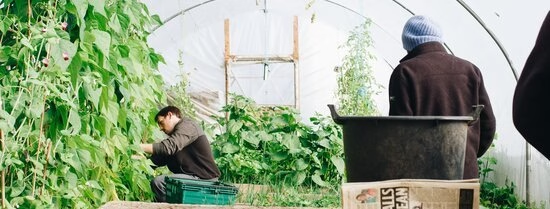What unfair labour practices affect migrant workers from Central and Eastern Europe (CEE) in the Dutch agricultural sector?
What factors drive the demand for and supply of precarious migrant labour in Dutch agriculture?
EU internal mobility in combination with persistent economic disparities between Central and Eastern European (CEE) and Western European countries have enabled Dutch employers to tap into a vast reservoir of labour migrants. According to trade union and government reports this has been coupled with migrant workers’ precarity and exploitation, including through low wages and high levels of income and employment insecurity.
Who pays the price for cheap cucumbers in the Netherlands?

'Migrant workers’ precarity is the flipside of the significant and growing economic role of the Dutch agro-food sector.'
As part of this research, Dr Karin Astrid Siegmann explored the causes, forms and possible responses to unfair labour practices affecting migrant workers from CEE in the Dutch agricultural sector. The research involved a desk study as well as targeted interviews with a range of (expert) stakeholders, including migrant workers, trade unions, non-governmental organisations and policy-makers.
The research is part of a broader comparative EU study focusing on supply, demand and practices in migrant agricultural labor in Northern Europe. The other two countries examined are Sweden and Germany. The project is funded by the Open Society European Policy Institute (OSEPI), the EU policy arm of the Open Society Foundations.
Why is this research relevant?
The Netherlands is the second largest agricultural exporter globally. Recent figures show that migrants from CEE countries such as Poland, Bulgaria and Romania form the bulk of the agricultural workforce. However, the high productivity goes hand in hand with high risks for migrant farmworkers.
The Dutch Labour Inspectorate regards agriculture as one of the top sectors for unfair work, noting that 'a flexible contract with a low wage and little certainty is the rule rather than the exception'.
Offering insights for strategic responses for more sustainable and just pathways towards change.
In a similar vein, the recent report of the Netherlands Scientific Council for Government Policy (WRR) on the future of work ('Better work: society’s new mission') notes that currently there are more than 2 million people on temporary, on-call and agency contracts. The report identifies this flexibilization of work as one of three core developments that can have far-reaching consequences for workers. Promoting safe and secure working environments is also part of UN Sustainable Development Goal 8 on decent work for all.
By conducting collaborative research with workers’ organizations, the research can offer insights for strategic responses for more sustainable and just pathways towards change.
Outputs
- The abuse behind a cheap supermarket cucumber - interview with Karin Astrid Siegmann by Studio Erasmus
- Migrant labour in Dutch agriculture: Regulated precarity - article in European Journal of Migration and Law
- Migrant workers in Dutch agriculture - Policy brief
- Migrant workers pay the price for Northern Europe's food security - Report and policy brief
- Revaluing essential workers - Blog post
Collaborations
The project is led by the European University Institute’s Robert Schuman Centre for Advanced Studies. From the side of ISS, Dr. Karin Astrid Siegmann conducted the research with support from ISS graduate Tyler Williams.
Funder
The project is funded by the Open Society European Policy Institute (OSEPI), the EU policy arm of the Open Society Foundations.
Contact

- Email address
- siegmann@iss.nl
For more information, contact Dr Karin Astrid Siegmann
